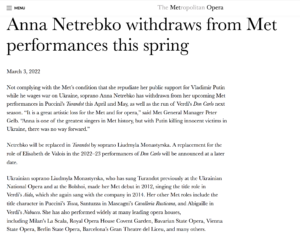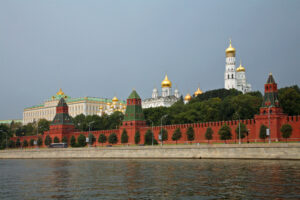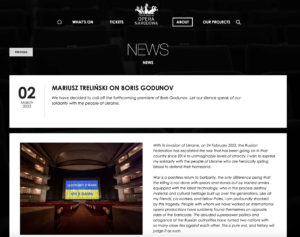Pick Up(2022/3/15) | Russia’s invasion of Ukraine unfolds the politics of music | Yumi Notohara
Russia’s invasion of Ukraine unfolds the politics of music
Text by Yumi Notohara
(This English text is a revised version of the original Japanese text by the author.)
Every video footage from the news on the war in Ukraine caused much horrible pain to me. No matter what the reason is, the war should not be justified. The Russian government should be blamed for its political decision and action in the future. Now I am worried about that the war will bring serious damage to our international exchanges and solidarities which have so far been built since the Dissolution of the Soviet Union. From now on, we should keep making every effort to understand each other through culture including music. This short essay was written about 10 days after when the Russian invasion began on 24 February 2022.
*****
The Russian invasion of Ukraine caused disturbances in the western culture. World famous musicians, Valery Gergiev and Anna Netrebko have been ostracized from the classical music world due to close ties to the President Vladimir Putin. Gergiev has often been criticized for his political actions such as the concert in the South Ossetia in 2008(1) or his endorsement of the President in the annexation of Crimea in 2014(2).  Music organisations such as orchestras, concert halls, and opera houses urged them to publicly denounce Putin immediately after the Russian invasion began on 24 February 2022. However, their efforts came to nothing. According to The New York Times, the Munich Philharmonic Orchestra dropped Gergiev from his post of the chief conductor because “he refused to denounce Mr. Putin’s invasion of Ukraine(3).” The Metropolitan Opera decided to end their contracts with Netrebko this season because they failed to persuade her to repudiate her supports for Putin(4). Thus, such “pro-Putin” artists have suddenly been purged from the western music world.
Music organisations such as orchestras, concert halls, and opera houses urged them to publicly denounce Putin immediately after the Russian invasion began on 24 February 2022. However, their efforts came to nothing. According to The New York Times, the Munich Philharmonic Orchestra dropped Gergiev from his post of the chief conductor because “he refused to denounce Mr. Putin’s invasion of Ukraine(3).” The Metropolitan Opera decided to end their contracts with Netrebko this season because they failed to persuade her to repudiate her supports for Putin(4). Thus, such “pro-Putin” artists have suddenly been purged from the western music world.
Since then, not only these artists, but also Russian music and culture themselves have faced “unfavorable circumstances.” Just one day after the invasion began, musicians with their roots in Russia such as Semyon Bychkov, Kirill Petrenko, and Evgeny Kissin made announcements to protest against this war and the Russian government(5). An Estonian conductor, Paavo Järvi announced his statement expressing his sympathy with Russian young musicians as follows: “these young people should not and cannot be punished”(6) when he decided to conduct the Russian Youth Orchestra in Moscow on 26 February 2022. It seems to imply that those who closely connected to Russia should explain their political stances publicly. Indeed, a Russian conductor, Tugan Sokhiev announced his resignation from both posts in France and Russia. According to his statement introduced on the website Operawire, he was “being asked to choose one cultural tradition over the other.(7)” The New York Times reported that he decided to quit “after facing intense pressure to condemn President Vladimir V. Putin of Russia’s invasion of Ukraine.(8)”
Thus, Russian culture became a “taboo” on a single night. The Russian State Ballet of Siberia were cancelled in the middle of the UK tour(9). The Polish National Opera announced cancellation of the premiere of Mussorgsky’s Boris Godunov on 2 March 2022. The Carnegie Hall cancelled the concerts of the Mariinsky Orchestra in May(10). Russian films have been dropped from the International Film Festival Title List(11). To make matters worse, the petition from Ukrainian Institute to “impose cultural sanctions on Russian Federation” was issued. It consists of six petitions and includes that Russian people should be prohibited from participating in the international competitions(12). All artists in Russia might be regarded as a “propaganda” under the Putin policy.
Indeed, it can be said that pro-Putin artists themselves are “propagandas.” Nonetheless, it is dubious whether this criterion can be applied to younger musicians. It is also doubtful whether Tchaikovsky or Mussorgsky can be advertised as the policy of the Russian government. We should not see all Russian music and musicians as “representativeness” of Russian government.
On the other hand, there is a view that the “cultural sanctions” could put some psychological pressure on Russian people to overthrow their government(13). But it is feared that boycott arouse hostility and detestation against the others. Probably, it could be much more dangerous than stimulating Russian people to protest against their government, because hostilities and detestations could bring conflicts in the near future. Another view is that Russia-based performances and films indirectly raise money for the war through taxation(11). Even if tax revenues are lost by the cultural boycott, it might not damage the Russian economy to defeat the Putin government, but it should damage amicable relationships between Russia and the others.
It can be said that a complete ban of specific music and culture is associated with a similar fanatical trend in Japanese society during the World War II when American and British music were dubbed and excluded as “those of hostile countries.” We could even say that the demand for boycotting some music or cultures under “the political bases” leads to totalitarianism and racial discrimination. Instead, we should recognise music as a tool to understand each other. Music can give us freedom and diversity, which can encourage us to promote our friendship across the world.
Therefore, it is quite agreeable that the World Federation of International Music Competitions announced the official statement: “the war has caused a growing isolation of Russian and Belarussian musicians, often without differentiation between state-sponsored artists who represent their government’s ideology, and musicians who have taken great risks and gone out of their way to voice their opposition to this war.” They added “organization will always protect and support young musicians regardless of where they come from.(14)” It is valuable for especially younger generation to develop mutual understanding.
 Thus, the Russian invasion of Ukraine unfolds the politics of music. Music has often been used to raise the power and the prestige of a particular person or nation. On the contrary, musicians have sometimes used the political power to secure their positions. We must say that music cannot be freed from the politics or the political society. We should act from a distance, otherwise our music must be dropped into the depths of politics.
Thus, the Russian invasion of Ukraine unfolds the politics of music. Music has often been used to raise the power and the prestige of a particular person or nation. On the contrary, musicians have sometimes used the political power to secure their positions. We must say that music cannot be freed from the politics or the political society. We should act from a distance, otherwise our music must be dropped into the depths of politics.
- Tom Service, “Music as politics: Gergiev’s South Osetia concert” The Guardian, August 22, 2008
- Arthur Lubow, “The Loyalist” The New York Times Magazine, March 12, 2009; Alex Ross, “Imperious” The New Yorker, October 28 2013
- Javier C. Hernández, “Valery Gergiev, a Putin Ally, Fired as Chief Conductor in Munich” The New York Times, March 1, 2022
- “Soprano Anna Netrebko withdraws from Met performances rather than renounce Putin” The Guardian, March 3, 2022
- “Russian Voices” VAN Magazine, February 25 2022
- Paavo Järvi, “Statement Concerning Ukraine,” Official Website February 28, 2022
- Francisco Salazar, “Tugan Sokhiev Resigns from both Bolshoi Theatre & Orchestre National du Capitole” Operawire, March 6 2022
- Javier C. Hernández, “Pressed About Putin, Russian Conductor Quits Bolshoi and French Posts” The New York Times, March 6, 2022
- “Ukraine crisis: Russian ballet company’s remaining UK tour dates cancelled” BBC NEWS, February 28, 2022
- Marissa Tomeo, “Carnegie Hall Cancels Upcoming Mariinsky Orchestra Performance.” Broadway World, February 27, 2022
- Alex Marshall “To Boycott Russians, or Not? In Film and Beyond, That’s the Question.” The New York Times, March 4, 2022
- “Petition from the Ukrainian Institute to impose cultural sanctions on Russia.” Official Website of International Committee for Museums and Collections of Modern Art
- Nadine Dorries, “Sport matters to Vladimir Putin – we can use it to cause him real pain.” The Telegraph, March 2, 2022
- “Statement of the WFIMC regarding Russian and Belarussian Candidates.” Official Website of the World Federation of International Music Competitions
(English version: 2022/3/26)
(Japanese original version:2022/3/15)



